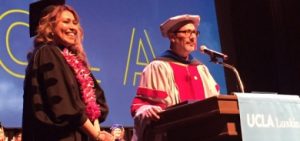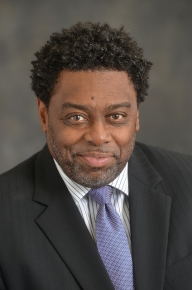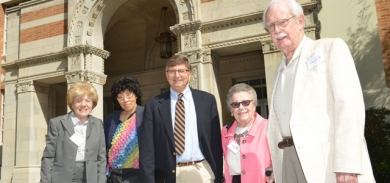UCLA brought together top researchers in the criminal justice field, congressional staff, a high-ranking official in the Obama administration and a California congressman for its first Rosenfield Forum in Washington, D.C., on Oct. 8.
More than 70 people participated in the half-day event, titled “Escaping the Prison Trap: How to Have Less Crime and Less Incarceration,” which included three panels and presentations by premiere scholars from UCLA and other institutions.
“We’re fortunate that within the walls of our school we had a diversity of approaches to the issues” that helped UCLA in hosting this forum, Franklin D. Gilliam Jr., dean of the UCLA School of Public Affairs, said in his opening remarks. “At the risk of sounding immodest, this diversity of approaches and viewpoints is a hallmark of our school and one of its great strengths.”
U.S. Associate Attorney General Thomas J. Perrelli, the third-highest ranking official in the Justice Department, led off the forum with a discussion of the Obama administration’s approach to crime prevention and reduction. His comments underscored Gilliam’s point about the wealth of expertise at UCLA.
“Everyone always talks about being ‘tough’ on crime, but our focus is being ‘smart’ on crime,” said Perrelli, who also worked under former Attorney General Janet Reno during the Clinton administration. “Research in this area is not research for its own sake; it is the kind of thing we really do hope to examine, implement and, frankly, learn more from. There really are people, particularly in this Justice Department, who are listening to the outcomes of your conversations and the research that you develop. We’re excited to hear more.”
“Escaping the Prison Trap” sought to address some of the major issues confronting the U.S. justice system today, including the country’s unprecedented incarceration rate; the role of communities in reducing crime, especially among juveniles; and the development of innovative programs for deterring crime and reducing prison crowding.
Two additional Rosenfield Forums will bring together UCLA scholars with national and local leaders this academic year; the next addresses transportation issues, and the final forum will explore issues related to youth in the foster care system.
“We’re excited, we’re thrilled to be here in Washington,” Gilliam said at the outset of the forum, which helped broaden UCLA’s influence as an institution committed to helping solve some of the nation’s most pressing problems. “We want to promote UCLA faculty and inform — and hopefully influence — the national debate.”
Throughout the four-hour discussion, scholars laid out the problems with our current prison system and ways to fix it.
“You have to figure out what works,” Perrelli said. “Nothing, really, should be off the table, and if you’re going to figure out what works, you need evidence and research to do that.”
He asked for the academics’ help on that front.
“Help us think outside the box about the next generation of promising approaches,” he said. “I think we’re asking the right questions about how to really make communities safer, how to reduce crime.”
Using evidence-based approaches and research and determining how to use governments’ limited resources more effectively is the path U.S. Attorney General Eric Holder’s Justice Department will follow, he added.
U.S. Rep. Adam Schiff (D–Calif.) repeated Perrelli’s request for assistance as he wrapped up the forum.
“We desperately need the expertise and insight of the people in this room,” he told the eight panelists and the experts assembled in the audience. “It’s always a fight in Congress” to try to change policy when crime is the issue.
Anyone who attempts to implement programs similar to the ones discussed during the three panels gets tagged as being “soft on crime,” Schiff said, making such programs a tough sell to legislators.
“But look at the crisis in California, where one-fourth of the prison population may have to be released by court order,” he said. “I don’t want to wait until we’re in a situation like that. We need to be more proactive, more thoughtful.”
Perrelli also addressed the issue’s political sensitivity and the implications of reform efforts.
“The easier course politically might simply be to take the ‘tough on crime’ approach, to announce the tough on crime mantra and put more people in jail,” Perrelli said.
But that won’t solve the problem, reduce crime or save money, he added.
“It shouldn’t surprise us that the system that we have now isn’t working particularly well,” Perrelli said. “You think about the amount of money that you’re spending on prisons, particularly in this era of budget cuts, and you ask yourself, ‘If I could make the community as safe or safer than it is today but reduce the level of incarceration and have those funds to do a host of other things, what could we do with that?'”
Panelists discussed a wide range of topics, from the effect of maximum-minimum sentencing guidelines to the perils of treating juvenile offenders as adults and the correlation between prison sentences and unemployment.
“The phrase ‘crime doesn’t pay’ is oft-repeated by those who are ‘tough on crime,’ yet statistics bear out that crime already doesn’t pay, literally,” said panelist
Mark Kleiman, a UCLA professor of public policy. “A burglar makes about $8 for every day he’s in prison.”
All the panelists criticized fixes that represent mere “tinkering” and recommended wholesale changes to the system.
“I don’t believe we can fix this with business as usual, but we can fix this — it is real,” said David Kennedy, director of the Center on Crime Prevention and Control at the City University of New York’s John Jay College of Criminal Justice.
David F. Weiman, an economics professor at Columbia University and Barnard College, offered just one reason why fundamentally changing the system would be so challenging.
“The status quo is deeply entrenched,” he said. “It’s an uphill battle because there’s a system already in place.” Weiman likened the potential need to close prisons to the extremely politically sensitive process of military base closures.
“Imagine closing prisons,” Weiman said. “Each prison has constituency,” just like the bases.
As the forum wrapped up, Gilliam said that Associate Attorney General Perrelli had laid out the theme in his opening remarks.
“Maybe the theme of the whole forum is being ‘smart’ on crime,” Gilliam said. “It’s not a matter of whether we are ‘tough’ on crime, but are we ‘smart’ on crime?”
Gilliam also encouraged academics, when returning to their research, to focus even more on solutions.
“One of the things that plagues this field is a ‘crisis’ focus,” he said. “There aren’t enough solutions.”





